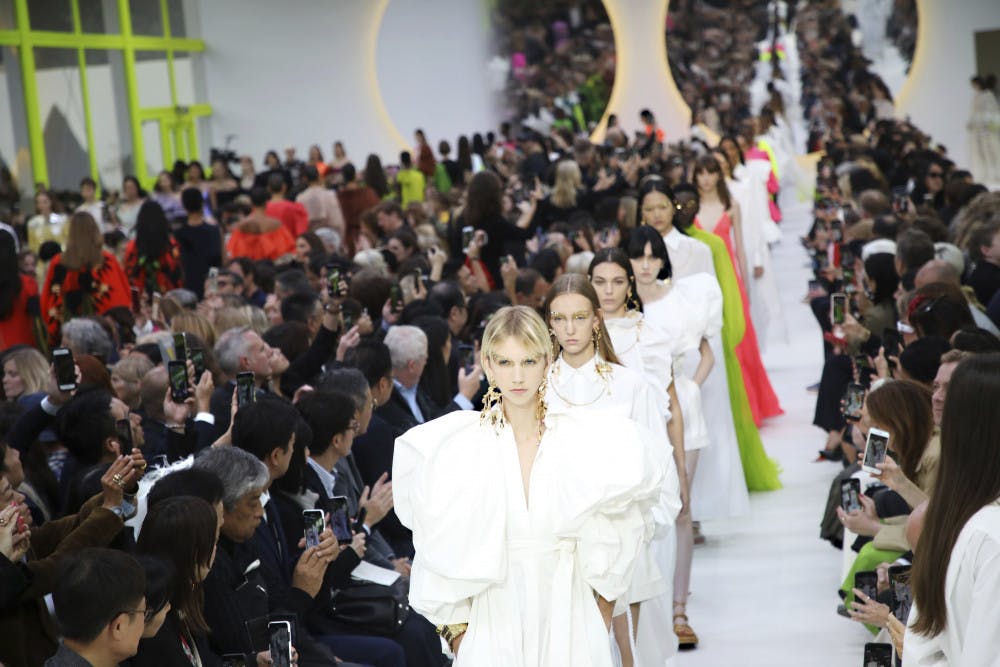Now more than ever, fashion brands have been attempting to ride the activism bandwagon.
As September comes to a close, so does the end of fashion month, when numerous brands took a stand on issues of their choice. Fashion brands using the vast exposure of fashion month to tackle an issue should be celebrated. However, there are appropriate ways of doing this.
In a recent Gucci runway show, the renowned fashion brand began its show with models moving down a conveyor belt runway while wearing straight jackets and blank stares. Afterward, the second series of models walked down the runway in effervescent colors and upbeat energy.
Runway model Ayesha Tan-Jones participated in silent-protest of the straight jackets by displaying the message “MENTAL HEALTH IS NOT FASHION.” The words were written on the model’s open-faced palms with black marker.
“The stigma around mental health must end,” Tan-Jones wrote on an Instagram post. “It is hurtful and insensitive for a major fashion house such as Gucci to use this imagery as a concept for a fleeting fashion moment."
Gucci responded to the upset by saying that they “designed these blank-styled clothes to represent how through fashion, power is exercised over life, to eliminate self-expression.”
In a world where mental health is constantly stigmatized and misunderstood, the utilization of straight jackets is insensitive. It serves as an addition to the thousands of false images associated with mental illness.
The so-called power emitting from the confined models was nowhere to be found besides the protest by Tan-Jones. If anything, the brand portrayed the models as powerless against mental illness.
It forgot the fact that mental illness looks different to each person. It forgot that people with mental illnesses are diverse.
Earlier in the month, New York streetwear brand Bstroy released hoodies that were tagged with the names of schools who suffered from mass shootings and torn with bullet holes.
In a statement to Time Magazine, Bstroy’s co-founder Dieter Grams said, “We wanted to make a comment on gun violence and the type of gun violence that needs preventative attention and what its origins are... while also empowering the survivors of tragedy through storytelling in the clothes.”
Embellishing bullet holes into clothing is not a symbol of empowerment. It trivializes shootings and normalizes them into culture. And they should never ever, be normalized.
Instead of garnishing hoodies with bullet holes to raise awareness, the brand could have donated a portion of its profits to March for our Lives or Sandy Hook Promise.
Kind intentions may have been present, but there are more appropriate ways to tackle social issues.
Prabal Gurung tackled American immigration laws by showcasing a diverse group of runway models wearing beauty pageant sashes featuring the question “Who gets to be American?” Luxury-brand owner François-Henri Pinault signed a “Fashion Pact” with 32 signatures from major retailers promising to produce more sustainably.
Everyone’s more than welcome to leap into advocacy. It should be encouraged. There are too many critical issues in the world to ignore. Fashion should not be exempt from joining. However, it is imperative that it, along with everyone else, does its research so that it acts with sensitivity and a genuine understanding.
Lauren Rousseau is a UF journalism sophomore.
Models wear creations as part of the Valentino Ready To Wear Spring-Summer 2020 collection, unveiled during the fashion week, in Paris, Sunday, Sept. 29, 2019. (Photo by Vianney Le Caer/Invision/AP)






